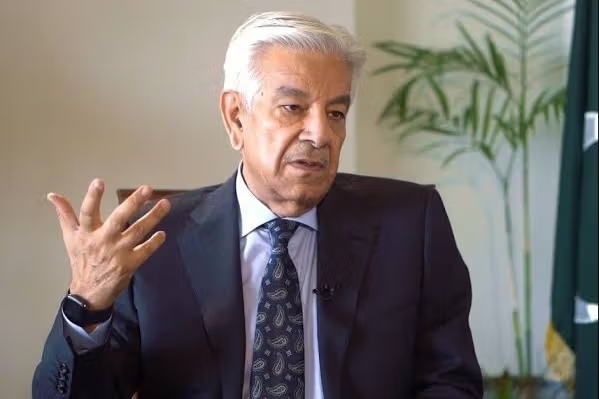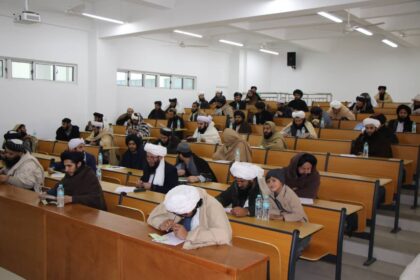RASC News Agency: Pakistan’s Defense Minister, Khawaja Asif, has issued one of Islamabad’s strongest warnings yet, declaring that if ongoing peace negotiations with the Afghanistani Taliban fail to yield tangible results, a direct military confrontation will be inevitable. His remarks reflect Islamabad’s growing impatience with a regime increasingly viewed as duplicitous, emboldened, and incapable of curbing cross-border militancy.
“Pakistan’s demand is straightforward,” Asif told Geo News. “The Taliban must prevent armed militants from using Afghanistani territory to attack Pakistan. Should these attacks continue, conflict will no longer be avoidable.”
The third round of talks hosted in Istanbul and mediated by Turkey and Qatar comes amid a sharp escalation in hostilities along the Afghanistan–Pakistan frontier, where deadly clashes and airstrikes have become disturbingly routine.
A high-level Pakistani delegation, led by Lt. Gen. Asim Malik, Director-General of Pakistan’s Inter-Services Intelligence (ISI), arrived in Istanbul earlier this week. The Taliban side is represented by a cluster of senior figures among them Mullah Abdul Haq Wasiq, chief of Taliban intelligence; Mawlawi Suhail Shaheen; Qari Rahmatullah Najib; Qahar Balkhi; Zakir Jalali; and Anas Haqqani many of whom are known for their rigid ideological stances and anti-Pakistani rhetoric.
Sources close to the talks say that while Ankara and Doha are pushing for de-escalation, both sides remain entrenched in mutual suspicion. Islamabad views the Taliban as untrustworthy custodians of Afghanistani sovereignty, unwilling or unable to rein in extremist proxies. The Taliban, for their part, accuse Pakistan of violating Afghanistani airspace and undermining their fragile rule through covert operations.
The second round of negotiations also held in Istanbul earlier this year ended without progress. Officials close to the mediators say that unless this round delivers a verifiable framework for border control and counterterrorism, the talks risk becoming a mere diplomatic performance.
The Istanbul dialogue follows a surge in hostilities triggered by Pakistan’s airstrikes in Kabul and Paktika in mid-October. The strikes, targeting hideouts of the Tehrik-i-Taliban Pakistan (TTP), were met with coordinated retaliatory assaults by Taliban fighters across at least seven Afghanistani provinces. The ensuing battles left dozens dead on both sides and reignited memories of the border wars that plagued the region in the early 2000s.
Pakistan accuses the Taliban regime of harboring and assisting TTP militants, a claim substantiated by intelligence reports indicating joint training facilities and logistical corridors shared by the two groups. Islamabad insists that the Taliban’s inaction constitutes a breach of international norms and the Doha Agreement, which prohibits the use of Afghanistani soil for terrorist activities.
“The Taliban cannot seek legitimacy abroad while exporting instability at home,” a senior Pakistani security official told RASC International. “They cannot be both government and guerrilla.”
The Taliban, true to form, have categorically denied sheltering the TTP, dismissing the allegations as “baseless propaganda.” Their spokesperson, Zabihullah Mujahid, attempted to justify the continued cross-border violence by claiming that Kabul “does not have complete control over the frontier regions.”
Analysts view this statement as a thinly veiled admission of weakness, and more tellingly, as a deliberate attempt to shirk accountability.
This stance has only deepened Islamabad’s distrust. Pakistani officials have repeatedly stated that any further cross-border assaults will be met with precision retaliation inside Afghanistan, a warning that underscores the erosion of diplomatic patience.
“Pakistan’s sovereignty is not negotiable,” Khawaja Asif reiterated. “If dialogue fails, deterrence will speak.”
In the first round of bilateral talks, both sides had reached a nominal consensus on three points:
• Continuation of the ceasefire;
• Creation of a joint monitoring and verification mechanism; and
• Enforcement of punitive measures in the event of violations.
Yet, none of these commitments have materialized. Taliban reluctance to confront extremist factions within its borders — groups often bound by tribal loyalty or shared ideology — has rendered these agreements meaningless. Experts note that the Taliban’s claim of being a stabilizing force is collapsing under the weight of its own militant alliances.
A senior analyst with the International Crisis Group told RASC International:
“The Taliban’s governance model is built on contradiction. They denounce terrorism to foreign diplomats while nurturing it at home. This duality is unsustainable, and Islamabad now appears unwilling to tolerate it.”
Beyond bilateral tensions, the Taliban’s failure to control transnational militancy poses a direct threat to regional stability. Their ideological alignment with extremist entities from TTP to elements of al-Qaeda and regional jihadist groups has revived fears of Afghanistan once again becoming a sanctuary for global terrorism.
Pakistan’s intelligence circles warn that unchecked militant flows across the Durand Line could ignite a wider regional crisis, drawing in Iran, China, and Central Asian republics already wary of the Taliban’s erratic governance.
For many in Islamabad, the Taliban’s inaction is no longer seen as mere negligence it is viewed as strategic complicity. Their refusal to dismantle terrorist infrastructure is, to many observers, a calculated move to retain leverage over Pakistan and assert influence in the broader regional chessboard.
Diplomats in Istanbul caution that this third round of negotiations may be the last chance to avert open conflict. Pakistan, under mounting domestic pressure to respond to escalating attacks, may soon abandon diplomacy in favor of military containment.
“The Taliban have mistaken Pakistan’s restraint for weakness,” a senior official in Islamabad told RASC International. “If this dialogue collapses again, our response will be decisive and sustained.”
In Kabul, the Taliban continue to portray themselves as victims of Pakistani aggression, yet their silence on militant activities speaks louder than their rhetoric. Their governance, increasingly characterized by authoritarian repression at home and belligerence abroad, has alienated not only Pakistan but also much of the international community.
The Istanbul talks are more than a diplomatic exercise; they represent a final test of whether the Taliban can function as a legitimate state actor rather than a militant syndicate cloaked in political authority.
For Pakistan, the outcome will determine whether dialogue remains a viable instrument of policy or whether the time has come for a harsher, more kinetic response.
As one senior Pakistani analyst put it:
“The Taliban have been given every opportunity to act as a responsible neighbor. If they continue to choose chaos over cooperation, they will have only themselves to blame when the consequences arrive not through negotiation, but through force.”






